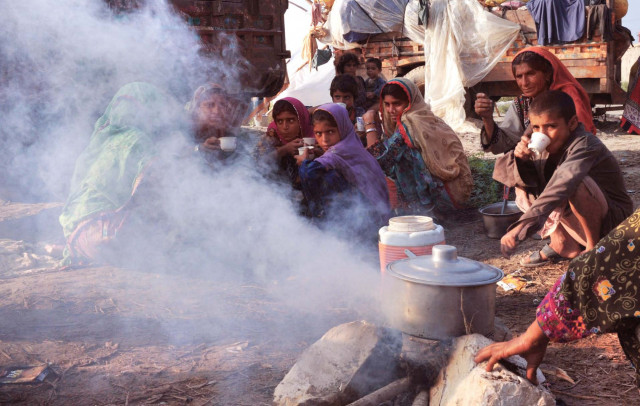NGOs feel ‘faith deficit’ with UN agencies
NGOs appeared less than happy at the end of the meeting with the United Nations (UN) agencies regarding flood relief.

NGOs feel ‘faith deficit’ with UN agencies
Organisations including the United Nations Office for the Coordination of Humanitarian Affairs (UNOCHA), Unicef, World Food Programme, UNAIDs and government representatives from the national disaster management authority (NDMA) met with NGOs and members of civil society in Sukkur’s Institute of Business Administration to discuss relief efforts for flood victims in the region.
Representatives of the agencies told participants that they were not willing to rely on the data already collected by the local administration and other organisations. They wished to start the process of getting information on the flood-affected areas and displaced people anew and hoped that the local NGOs would help them out in this effort.
Fawad Hussain of the UNOCHA said, “We want to make sure that the aid provided by the UN agencies goes out to those who really need it.” He said that they will form committees to oversee relief camps and rehabilitation activities. “We want to identify cases of mishandling and ensure that everyone, especially women and children are provided for.”
Not everyone in the audience was satisfied with the plan.
“We have been here for seven days or more,” said a disgruntled volunteer, “These people just came today and have started giving orders.”
Many were unhappy with what they termed ‘dictation’ by the UN agencies.
The NGOs were told to fill out the forms, which asked details of where the participants were from, their area of expertise and name of organisation, ‘there and then’. Submissions tomorrow would not be accepted, they were told.
Through these forms, the agencies would select the NGOs they want to work with, while the organisations found to be lacking in credibility would be removed from their list. Akram Sheikh from Indus Resource Centre expressed his dissent at the direction of the meeting. The agencies say that they are here to help but they don’t want to make use of what we have already done, he argued, adding that it was a hassle to go through the entire process of data collection all over again. He emphasised that relief efforts should be “based on trust” between the UN agencies and the NGOs.
Meanwhile, the Sindh scouts withdrew their offer to work with the UN after the meeting. Representatives said that they did not agree with the attitude shown and would only help if it was required, and asked for it, later.
The spokesman for another local NGO echoed similar feelings and said this kind of attitude is not acceptable to the NGOs that have been working day and night for the flood-affected people.
Plans discussed, fears expressed
The UN agencies plan to set up tents village across the province. They will pay special attention to bathroom facilities and hygiene since the families displaced by the flood are already exposed to various diseases.
Each family will be provided a small toilet and proper water supply will be ensured, said Hussain.
Other officials at the meeting included Andrew J from Unicef, Daurde Jessen from World Food Programme, Dr Safdar Salman from UNAIDS, the chief relief commissioner for Sindh Ghulam Ali Pasha, NDMA director general Saleh Farooqui and Special Secretary Health Captain Dr Abdul Majid.
More families in the province will be forced to leave their homes and the affected people in Sindh will double, said Pasha.
He stressed the importance of collecting information on how many people in a family were being moved, where these families were coming from and so forth so that once the flood recedes, these people can be taken back to where they belong.
An implicit fear behind a lack of such information is that too many people will settle in one district, putting a strain on that area’s resources.
Farooqui said that the government had its own mechanism of data collection and loss assessment. UN agencies will be given the data collected by the government so that they can identify which areas were most affected and what are the needs of these people.
Published in The Express Tribune, August 11th, 2010.



















COMMENTS
Comments are moderated and generally will be posted if they are on-topic and not abusive.
For more information, please see our Comments FAQ